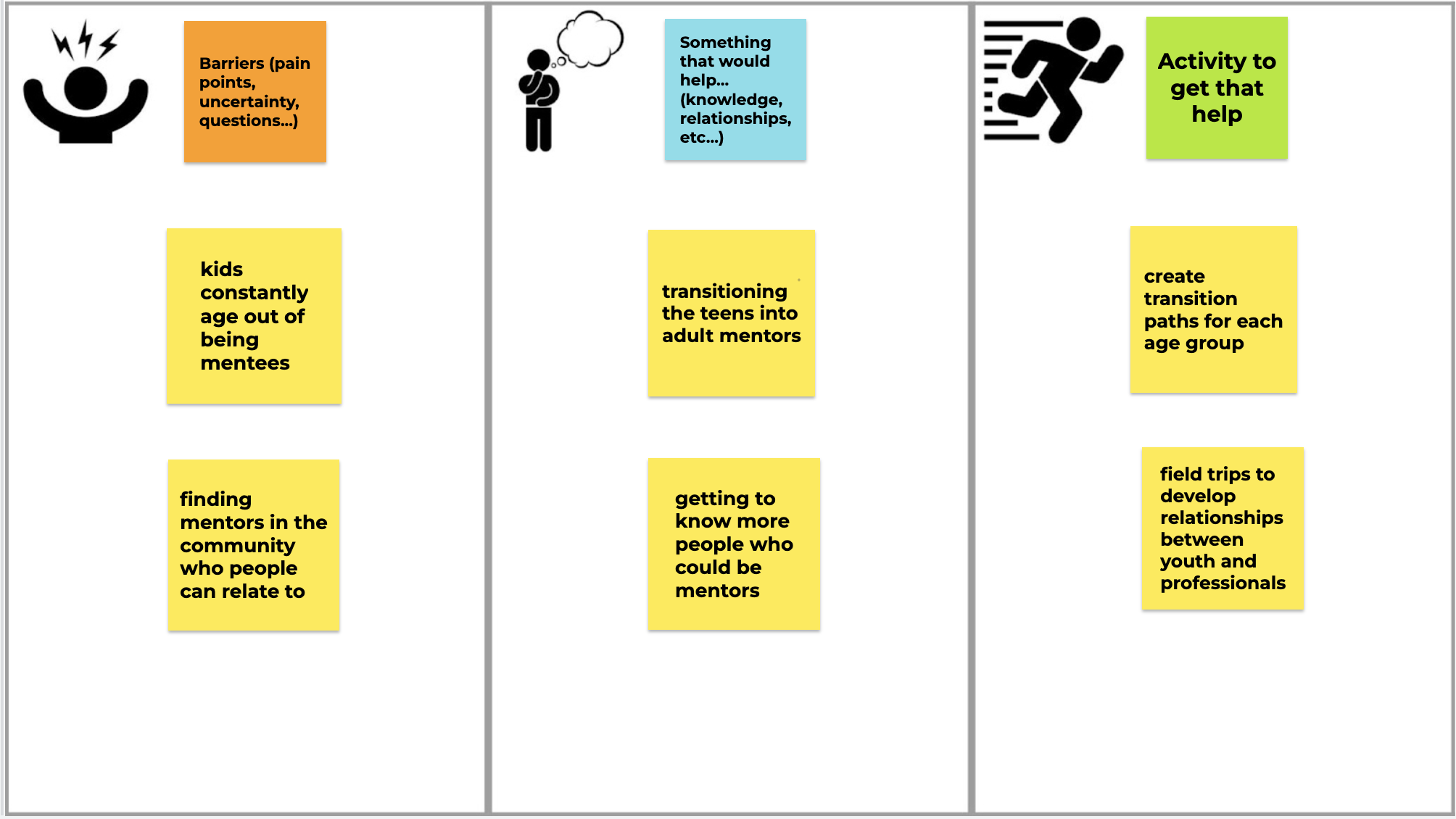Troubleshooting Mentoring Challenges
It can be challenging to create successful mentorship experiences. It may take several attempts, plenty of time, and significant effort to build a supportive community with meaningful relationships. This section outlines some common challenges and solutions.
Unique Communities
Every community is unique, of course, but you may be thinking “These ideas won’t work, because my community is too” – fill in the blank: too small, too big, too rural, too urban, doesn’t have the right adults, doesn’t have the right teens, and so on. Whatever your community is like, don’t try to reinvent the wheel. What are other organizations doing to establish mentoring relationships in your area?
“Specifically look at other service models… to see how their concepts/training/methods could translate to libraries recruiting for teen mentorship programs. I started looking into Big Brothers Big Sisters to see their method and it gave me some ideas about how I could partner with that organization in my community to recruit/train adult mentors in a library setting.
– SE, ConnectedLib Contributor
SE found some information relating to mentorship and similar outcomes on the Big Brothers Big Sisters website. See if you can find similar information about organizations in your area (you may need to reach out in person).
Restrictive Policies
“Think about partnering with local organizations — they already have a lot of those policies and procedures for safely working with youth in place and could bear some or all responsibility and the library could be more of a support or conduit.”
– Sara Evans, ConnectedLib partner, Trails Regional Library (MO)
Unfamiliar Technologies
“The connected learning model requires librarians and staff members to leap into an uncharted territory.”
– Mega Subramaniam et al., Using Technology to Support Equity and Inclusion in Youth Library Programming: Current Practices and Future Opportunities, The Library Quarterly, 88(4).
Some people are reluctant to view themselves as digital media mentors because they are not confident in their ability to use the latest technologies. Instead of seeing this as a limitation, view it as an opportunity to engage in colearning by letting go of the “expert” role and becoming a partner, exploring the technology alongside the young person. By doing this, you will also be modeling effective learning practices.
You may also consider partnering with someone in the community with skills that complement yours. Pairing a subject-matter expert with someone who knows how teens learn and how to work with them is often a successful combination.
Ready to Code, by Linda Braun and Marijke Visser, discusses coding and computational thinking programs in libraries, run by staff without formal technology backgrounds, along with the challenges and opportunities they face.
Time commitment too large
Some potential mentors you approach — particularly people who have not served as mentors before — may balk at the idea of a long-term time commitment. Sonya Harsha, ConnectedLib partner from Algona (IA) Public Library, recommends thinking in terms of “project-based mentoring.” For instance, an engineer could help you with a short series of engineering workshops, or work with a teen on a specific project. This may have the added benefit of warming them up to the idea of mentoring more in the future.
Lack of mentoring experience
A new mentor may be intimidated or unsure about the “right” approach to working with teens. In these situations, a few different approaches may help.
- Be the facilitator in expert-led programming to help increase the mentor’s level of comfort
- For interns or youth as mentors, allow them to practice and ask questions about how to lead and coach
- Provide support in the mentor’s planning activities, workshops, or events. For example, allow the mentor to build the content or curriculum and then offer suggestions for making it work with a teen audience. For example, you could let them know when they should add breaks into the schedule
- “Mentoring the mentors” is an integral part of all librarianship, and if you or another library staff member are the inexperienced mentor in question, you can find your own mentoring and support in meetings, training sessions, workshops, or informal conversations.
Library organizations such as American Libraries Association and YALSA, as well as ALA-affiliated associations, offer mentoring programs:
- YALSA’s Virtual Mentoring Program
- ALA Emerging Leaders Program
- REFORMA Mentoring Program
- Asian Pacific American Librarians Association
- Chinese American Librarians Association
“I actually call people a lot and I text people and I follow people on their Instagrams. And then I actually like getting together with people in real life and having dinner…”
— Adult Librarian at an urban western library
Informal mentoring also occurs when library workers network with others in the field. Likewise, social media can allow you to connect with and meet other library workers and discuss ideas in a group format. You can also seek out mentors and connections with people outside of public libraries, such as teachers, professionals in STEM fields, parents of tweens and teens, and faculty within library schools.
Worksheet #6: Anticipating Challenges
Use this worksheet to anticipate and problem-solve challenges you might face relating to mentoring. In the first column, list any barriers, concerns, or pain points. In the second column, think about what kind of resources can help you overcome those barriers. Finally, in the third column, brainstorm some activities you can undergo that will help you get those resources.
Here is a sample worksheet completed by some of our ConnectedLib librarian partners (click to enlarge):

